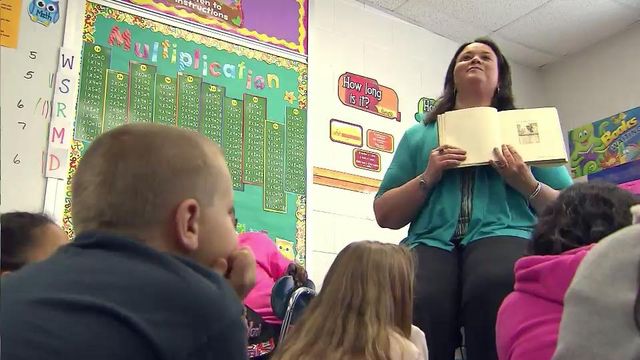Teacher pay raises still on hold in budget standoff
Senate leaders rolled out mini-budgets Wednesday to pay for scheduled step increases for teachers, but said salary increases remain caught in the standoff with Gov. Roy Cooper. The two bills also include small raises for UNC and community college workers and retirees.
Posted — UpdatedThat was the word from Senate Republican leaders Wednesday as they rolled out two "mini-budgets" providing funding for other increases in education and retiree compensation.
House Bill 377 provides money for scheduled "step" increases for teachers, assistant principals and instructional support personnel. Those increases are based on years of experience in North Carolina's schools, and some, but not all teachers, are eligible for them. It also includes money to pay for principals' salary increases and bonuses if their school was in the top 50 percent in the state for educational growth.
The bill does not include across-the-board pay raises for teachers. When Democrats on the the Senate Appropriations committee asked why not, Senate Majority Leader Harry Brown, the bill's sponsor, said there had been no discussions on that topic with Gov. Roy Cooper.
Cooper, in turn, has blamed GOP leaders for refusing to negotiate.
"Our budget funded teacher pay increases around 3.8 percent over the two years, and the governor asked for 8.5 two years," added Sen Rick Horner, R-Nash. "This just doesn’t address where we’re disagreeing."
Sen. Jerry Tillman. R-Randolph, said Cooper's push for bigger teacher raises and a Medicaid expansion is unrealistic.
"Ask him to show where we’re going to be able to afford Medicaid expansion and teacher pay raises of 8.5 percent. There’s not enough money in this state unless you take it out of the taxpayer’s pocket," Tillman said.
Brown added that there would be no budget negotiations with Cooper as long as the governor continues to insist that Medicaid expansion be included in any deal. In the meantime, he added, "What we’re trying to do with these mini-budgets is address those pieces that everybody can agree on."
"This seems like piecemealing," objected Sen. Gladys Robinson, D-Guilford. "I cannot agree on that."
The North Carolina Association of Educators, the state's largest teacher organization, was critical of the Senate proposal.
The committee passed both House Bill 377 and another measure, House Bill 231, which funds pay raises for University of North Carolina and community college employees, as well as a small one-time supplement for state retirees.
The UNC system raises would average about 0.5 percent, committee staff explained, though the UNC Board of Governors has the power to decide how they should be allocated.
Community college system employees would see a 1 percent increase this year, and another 1 percent in 2020.
House Bill 231 also includes a one-time 0.5 percent bonus payment for state retirees this fall and again in 2020.
The bills need to pass two Senate votes and then at least one more in the House before heading to the governor.
Related Topics
• Credits
Copyright 2024 by Capitol Broadcasting Company. All rights reserved. This material may not be published, broadcast, rewritten or redistributed.






